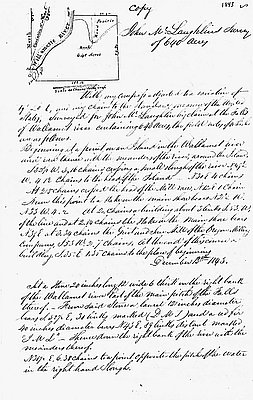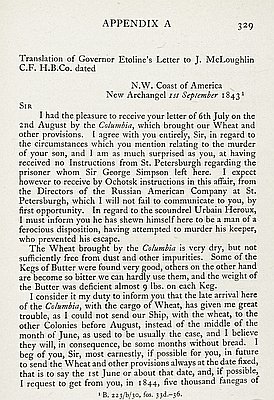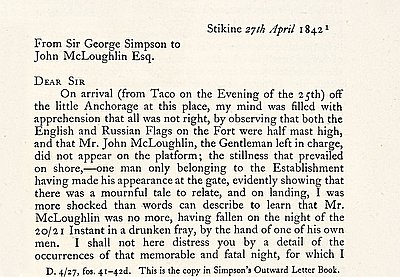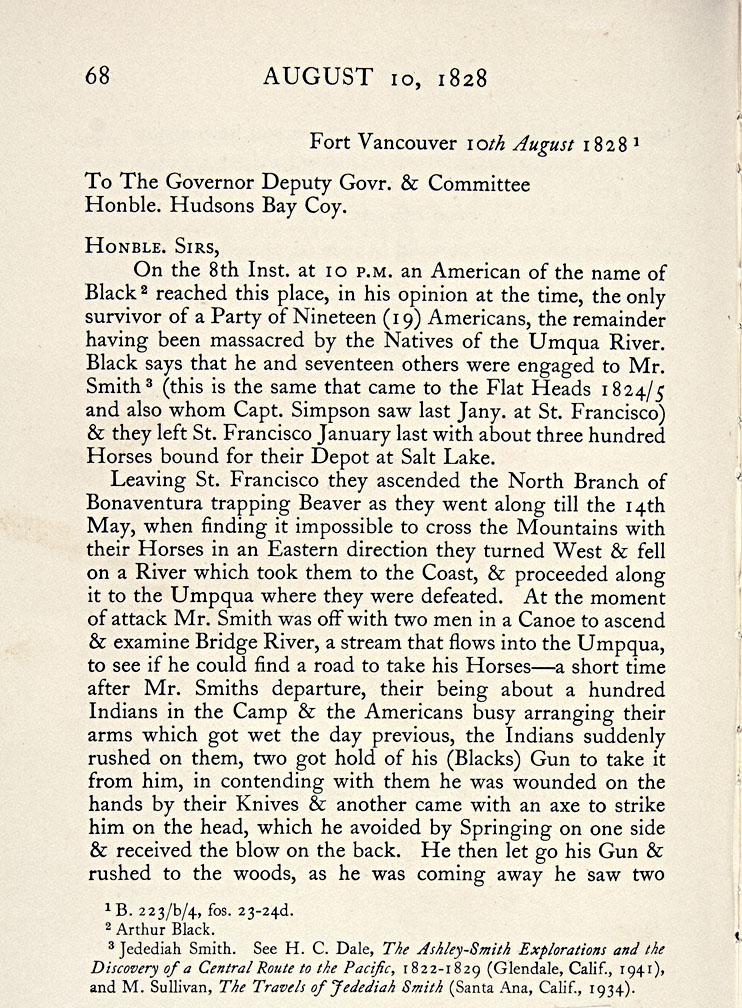- Catalog No. —
- OHS Lib 971 H886 v1-68-70
- Date —
- August 10, 1828
- Era —
- 1792-1845 (Early Exploration, Fur Trade, Missionaries, and Settlement)
- Themes —
- Environment and Natural Resources, Native Americans, Oregon Trail and Resettlement, Trade, Business, Industry, and the Economy
- Credits —
- Oregon Historical Society
- Regions —
- Coast Columbia River Willamette Basin
- Author —
- John McLoughlin
John McLoughlin to Hudson's Bay Co., 1828
John McLoughlin, chief factor of the Hudson’s Bay Company’s Columbia Department, wrote this letter to his superiors on August 10, 1828—two days after Arthur Black, one of four survivors of Jedediah Smith’s fur trading party, found his way to Fort Vancouver. Smith’s party was attacked by Kalawatset (or Lower Umpqua) Indians near the mouth of the Umpqua River on July 14, 1828.
In late 1827, Jedediah Smith and his trapping party of twenty men, organized under the American company of Smith, Jackson & Sublette, moved northward out of Mexican California into southern Oregon. Smith had acquired horses and mules in California and hoped to trade them at the annual fur trappers’ Rendezvous in the Rocky Mountains. Along the way, Smith planned to hunt and trap beaver, prized for their high-quality fur in both American and European markets.
Smith’s party arrived at the mouth of the Umpqua River on July 11, 1828. According to the diary of Harrison Roger, one of Smith’s party, on July 12th, an “Omp quch” Indian was taken captive for having stolen an ax. “Capt. Smith and one of them caught him & put a cord round his neck, and the rest of us stood with our guns ready in case they made any resistance, there was about 50 Inds present, but did not pretend to resist tying the other…”
Unbeknownst to the Americans, the seized Indian was a Kalawatset headman. According to historian Dale Morgan, the offended headman returned to his people and lobbied for an immediate attack upon Smith’s party so that he might have justice, but another headman’s call for peace won the day. Unfortunately, the second headman was subsequently insulted by Black on a visit to the American’s camp two days later—by being forced to dismount from his horse.
On July 14th, Smith left camp early in the morning to scout a route toward the Willamette Valley. While he was gone, approximately 100 Kalawatset were invited into the camp by Harrison Rogers. Once admitted, they attacked—killing nearly all of Smith’s party. Four survivors made their way north to Hudson’s Bay Company’s Fort Vancouver, arriving on August 8th (Black) and 10th (Smith, “Big” John Turner, and Richard Leland).
McLoughlin immediately made plans for the retrieval of Smith’s property and retaliation, if it was found to be necessary. He worried that “the success & facility with which the Natives have accomplished their object lowers Europeans in their estimation & consequently very much diminishes our security.” In charge of forty men (including 14 Indians and the four survivors of Smith’s original party), Alexander McLeod set out for the Umpqua Valley in September under orders from McLoughlin to “make War on the Murderers of his [Smith’s] people to make them restore his property or drop the business entirely.”
Shortly after McLeod’s arrival in Umpqua territory in October, he learned that Smith’s party had made enemies of the Kalawatset by insulting one of their high-ranking members. McLeod subsequently helped Smith repossess some of his lost property (including Smith’s and Rogers’ journals), but made no attempt to retaliate against the Kalawatset.
Further Reading:
Morgan, Dale. Jedediah Smith and the Opening of the West. New York, N. Y., 1953.
Beckham, Stephen Dow. Land of the Umpqua: A History of Douglas County, Oregon. Roseburg, Oreg., 1986.
Written by Joshua Binus, © Oregon Historical Society, 2006.
Related Historical Records
-
McLoughlin Land Survey Claim, 1843
This J. M. Hudspeth survey was carried out at John McLoughlin’s request on December 16, 1843. At the time, McLoughlin was involved in a land dispute with Alvin Waller who …

-
From Adolph Etoline to John McLoughlin, 1843
On September 1, 1843, Adolph Karlovich Etoline, governor of the Russian American Company (RAC), wrote this letter to John McLoughlin, chief factor of the Hudson’s Bay Company’s (HBC) Columbia Department, …

-
George Simpson to John McLoughlin, 1842
Hudson’s Bay Company (HBC) Governor George Simpson wrote this short letter to John McLoughlin, chief factor of the company’s Columbia Department, on April 27, 1842, to inform him of …

